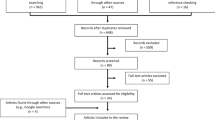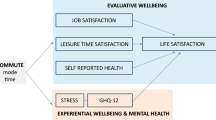Abstract
Although providing informal care can negatively affect caregiver emotional health and lead to depression, the association between caregiver depression and missed work is unknown. We use data from the National Longitudinal Caregiver Survey to examine the relationship between caregiver depression and missed work among informal caregivers for older veterans with Alzheimer’s disease or vascular dementia. Two-part models are used to estimate the expected hours of work missed among working caregivers. Caregiver depression is statistically significantly associated with the likelihood and amount of time missed at work, resulting in an average of an extra half-day of work missed per month. While the effect of caregiver depression on work missed is modest, it represents another possible benefit from interventions to support caregivers.
Similar content being viewed by others
References
Aguglia, E., Onor, M. L., Trevisiol, M., Negro, C., Saina, M., & Maso, E. (2004). Stress in the caregivers of alzheimer’s patients: An experimental investigation in Italy. American Journal of Alzheimers Disease and Other Dementias, 19(4), 248–252.
American Medical Association. (1993). Physicians and family caregivers. A model for partnership. Journal of the American Medical Association, 269(10), 1282–1284.
Baumgarten, M., Battista, R. N., Infante-Rivard, C., Hanley, J. A., Becker, R., & Gauthier, S. (1992). The psychological and physical health of family members caring for an elderly person with dementia. Journal of Clinical Epidemiology, 45(1), 61–70.
Blazer, D., Burchett, B., Service, C., & George, L. K. (1991). The association of age and depression among the elderly: An epidemiologic exploration. Journal of Gerontology, 46(6), M210–M215.
Burton, W. N., Chen, C. Y., Conti, D. J., Pransky, G., & Edington, D. W. (2004). Caregiving for ill dependents and its association with employee health risks and productivity. Journal of Occupational and Environmental Medicine, 46(10), 1048–1056.
Cantor, M. (1983). Strain among caregivers: A study of experience in the United States. The Gerontologist, 23(6), 597–604.
Charles, K. K. & Sevak, P. (2005). Can family caregiving substitute for nursing home care? Journal of Health Economics, 24(6), 1174–1190.
Clipp, E. C. (1998). National Longitudinal Caregiver Study: Codebook. Durham, NC: Duke University. .
Covinsky, K. E., Goldman, L., Cook, E. F., Oye, R., Desbiens, N., Reding, D., Fulkerson, W., Connors, A.F. Jr, Lynn, J, & Phillips, R.S. (1994). The impact of serious illness on patients’ families. Journal of the American Medical Association, 272(23), 1839–1844.
Dilworth, J. & Kingsbury, N. (2005). Home-to-job spillover for generation x, boomers, and matures: A comparison. Journal of Family and Economic Issues, 26(2), 267–281.
Duan, N., Manning, W. G., Morris, C. N., & Newhouse, J. P. (1984). Choosing between the sample-selection and multi-part model. Journal of Business and Economic Statistics, 2(3), 283–289.
Ettner, S. L. (1995). The impact of “parent care” on female labor supply decisions. Demography, 32(1), 63–80.
Evans, D. A., Funkenstein, H. H., Albert, M. S., Scherr, P. A., Cook, N. R., Chown, M. J., Chown, M. J., Hebert, L. E., Hennekens, C. H., & Taylor, J. O. (1989). Prevalence of alzheimer’s disease in a community population of older persons. Journal of the American Medical Association, 262(18), 2551–2556.
Fast, J. E., Williamson, D. L., & Keating, N. C. (1999). The hidden costs of informal elder care. Journal of Family and Economic Issues, 20(3), 301–326.
Government Accountability Office. (1998). Alzheimer’s disease: Estimates and prevalence in the United States (No. HEHS-98–16). Washington, DC: U. S. General Accounting Office.
Harwood, D. G., Barker, W. W., Cantillon, M., Loewenstein, D. A., Ownby, R., & Duara, R. (1998). Depressive symptomatology in first-degree family caregivers of Alzheimer disease patients: A cross-ethnic comparison. Alzheimer Disease and Associated Disorders, 12(4), 340–346.
Hays, J. C., Blazer, D. G., & Gold, D. T. (1993). Ces-d: Cutpoint or change score? Journal of the American Geriatric Society, 41(3), 344–345.
Hebert, L. E., Beckett, L. A., Scherr, P. A., & Evans, D. A. (2001). Annual incidence of Alzheimer disease in the United States projected to the years 2000 through 2050. Alzheimer Disease and Associated Disorders, 15(4), 169–173.
Kennedy, P. (1981). Estimation with correctly interpreted dummy variables in semilogarithmic equations. American Economic Review, 71, 801.
Kessler, R. C., Barber, C., Birnbaum, H. G., Frank, R. G., Greenberg, P. E., Rose, R. M., Simon, G. E., & Want, P. (1999). Depression in the workplace: effects on short-term disability. Health Affairs, 18(5), 163–171.
Kohout, F. J., Berkman, L. F., Evans, D. A., & Cornoni-Huntley, J. (1993). Two shorter forms of the ces-d (center for epidemiological studies depression) depression symptoms index. Journal of Aging and Health, 5(2), 179–193.
Langa, K. M., Chernew, M. E., Kabeto, M. U., Herzog, A. R., Ofstedal, M. B., Willis, R. J., Wallace, R. B., Mucha, L. M, Straus, W. L., & Fendrick, A. M. (2001). National estimates of the quantity and cost of informal caregiving for the elderly with dementia. Journal of General Internal Medicine, 16(11), 770–778.
Lo Sasso, A. T. & Johnson, R. W. (2002). Does informal care from adult children reduce nursing home admissions for the elderly? Inquiry, 39(3), 279–297.
Mack, J. L., Patterson, M. B., & Tariot, P. N. (1999). Behavior rating scale for dementia: Development of test scales and presentation of data for 555 individuals with Alzheimer’s disease. Journal of Geriatric Psychiatry and Neurology, 12(4), 211–223.
Majerovitz, S. D. (1995). Role of family adaptability in the psychological adjustment of spouse caregivers to patients with dementia. Psychology and Aging, 10(3), 447–457.
Martire, L. M., Stephens, M. A., & Townsend, A. L. (1998). Emotional support and well-being of midlife women: Role-specific mastery as a mediational mechanism. Psychology and Aging, 13(3), 396–404.
Metropolitan Life Insurance Company. (1997). The metlife study of employer costs for working caregivers. Westport, CN: MetLife Mature Market Group and National Alliance for Caregiving.
Moore, M. J., Zhu, C. W., & Clipp, E. C. (2001). Informal costs of dementia care: Estimates from the national longitudinal caregiver study. Journal of Gerontology, Series B, Psychological Sciences and Social Sciences, 56(4), S219–228.
National Institute of Aging. (2002). 2001–2002 Progress report on Alzheimer’s disease. Washington, DC: National Institute of Health.
Norton, T. R., Stephens, M. A., Martire, L. M., Townsend, A. L., & Gupta, A. (2002). Change in the centrality of women’s multiple roles: Effects of role stress and rewards. Journal of Gerontology Series B Psychological Sciences and Social Sciences, 57(1), S52–62.
O’Hara, B. (2004). Do mothers work to support ailing husbands? Journal of Family and Economic Issues, 25(2), 179–198.
Pezzin, L. E., Kemper, P., & Reschovsky, J. (1996). Does publicly provided home care substitute for family care? Experimental evidence with endogenous living arrangements. The Journal of Human Resources, 31(3), 650–676.
Sansoni, J., Vellone, E., & Piras, G. (2004). Anxiety and depression in community-dwelling, Italian Alzheimer’s disease caregivers. International Journal of Nurse Practitioners, 10(2), 93–100.
Schulz, R., Mendelsohn, A. B., Haley, W. E., Mahoney, D., Allen, R. S., Zhang, S.,Thompson, L., & Belle, S.H. (2003). End-of-life care and the effects of bereavement on family caregivers of persons with dementia. New England Journal of Medicine, 349(20), 1936–1942.
Small, G. W., McDonnell, D. D., Brooks, R. L., & Papadopoulos, G. (2002). The impact of symptom severity on the cost of Alzheimer’s disease. Journal of the American Geriatric Society, 50(2), 321–327.
Spillman, B. C. & Pezzin, L. E. (2000). Potential and active family caregivers: Changing networks and the “sandwich generation”. Milbank Quarterly, 78(3), 339–347.
Stern, S. (1995). Estimating family long-term care decisions in the presence of endogenous child characteristics. Journal of Human Resources, 30(3), 551–580.
Stewart, W. F., Ricci, J. A., Chee, E., Morganstein, D., & Lipton, R. (2003). Lost productive time and cost due to common pain conditions in the U.S. workforce. Journal of the American Medical Association, 290(18), 2443–2454.
Stone, R., Cafferata, G. L., & Sangl, J. (1987). Caregivers of the frail elderly: A national profile. The Gerontologist, 27(5), 616–626.
Tariot, P. N., Mack, J. L., Patterson, M. B., Edland, S. D., Weiner, M. F., Fillenbaum, G., Blazina, L., Teri, L., Rubin, E., & Mortimer, J. A.. (1995). The behavior rating scale for dementia of the consortium to establish a registry for Alzheimer’s disease. American Journal of Psychiatry, 152(9), 1349–1357.
Thompson, R. L., Lewis, S. L., Murphy, M. R., Hale, J. M., Blackwell, P. H., Acton, G. J., Patrick, G. J., & Bonner, P. N. (2004). Are there sex differences in emotional and biological responses in spousal caregivers of patients with Alzheimer’s disease? Biological Research in Nursing, 5(4), 319–330.
Van Houtven, C. H., & Norton, E. C. (2004). Informal care and elderly health care use. Journal of Health Economics, 23(6), 1159–1180.
Ward, D. (1991). Uncounted care. Journal of Family and Economic Issues, 12(1), 77–87.
Whetten-Goldstein, K., Sloan, F., Kulas, E., Cutson, T., & Schenkman, M. (1997). The burden of Parkinson’s disease on society, family, and the individual. Journal of the American Geriatric Society, 45(7), 844–849.
White-Means, S. I. & Chang, C. F. (1992). Informal caregiver’s leisure time and stress. Journal of Family and Economic Issues, 15(2), 117–136.
White-Means, S. I. & Rubin, R. M. (2004). Trade-offs between formal home health care and informal family caregiving. Journal of Family and Economic Issues, 25(3), 335–358.
Acknowledgements
We thank Eugene Z. Oddone and Morris Weinberger at the Center for Health Services Research in Primary Care for funding for Mr. Wilson’s internship.
Author information
Authors and Affiliations
Corresponding author
Rights and permissions
About this article
Cite this article
Wilson, M.R., Van Houtven, C.H., Stearns, S.C. et al. Depression and Missed Work among Informal Caregivers of Older Individuals with Dementia. J Fam Econ Iss 28, 684–698 (2007). https://doi.org/10.1007/s10834-007-9081-8
Published:
Issue Date:
DOI: https://doi.org/10.1007/s10834-007-9081-8




